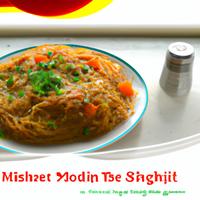
1 serving (150 grams) contains 200 calories, 4.0 grams of protein, 5.0 grams of fat, and 35.0 grams of carbohydrates.

Log this food in SnapCalorie

Nutrition Information
Calories |
320.0 | ||
|---|---|---|---|
% Daily Value* |
|||
| Total Fat | 8.0 g | 10% | |
| Saturated Fat | 1.6 g | 8% | |
| Polyunsaturated Fat | 0 g | ||
| Cholesterol | 0 mg | 0% | |
| Sodium | 480 mg | 20% | |
| Total Carbohydrates | 56.0 g | 20% | |
| Dietary Fiber | 3.2 g | 11% | |
| Sugars | 3.2 g | ||
| protein | 6.4 g | 12% | |
| Vitamin D | 0 mcg | 0% | |
| Calcium | 32.0 mg | 2% | |
| Iron | 2.4 mg | 13% | |
| Potassium | 160.0 mg | 3% | |
* Percent Daily Values are based on a 2,000 calorie diet. Your daily values may be higher or lower depending on your calorie needs.
Food Attributes
Source of Calories
About Cooked sukhi seviyan
Cooked Sukhi Seviyan, also known as dry vermicelli, is a simple and flavorful dish popular in South Asian cuisine, particularly in India and Pakistan. Made primarily with roasted vermicelli, this preparation often includes aromatic spices such as cardamom, cinnamon, and cloves. It typically incorporates ghee or oil alongside sweeteners like sugar or jaggery, creating a subtly sweet profile. Some variations may include nuts such as almonds or cashews for added texture and flavor. While Sukhi Seviyan is low in protein and fiber, it provides a quick source of energy due to its carbohydrate content. However, the use of ghee or refined sugar can contribute to higher fat and calorie levels, making portion control essential for healthier consumption. Substituting sugar with natural sweeteners and reducing the use of fat can make this dish a lighter option for dessert or breakfast.



